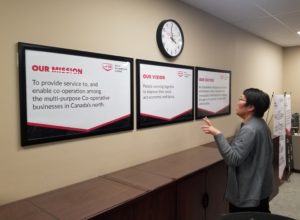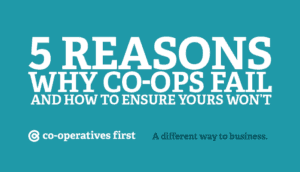Photo by Loic Leray on Unsplash
When deciding whether to start a co-op, people’s first question is often about risk. How much risk am I taking on or exposed to? If the co-op has financial trouble or doesn’t succeed, what does it mean for me? These are good and valid questions.
A general answer is, because co-ops are incorporated businesses, individual owners — the co-op’s members — have limited liability.
Limited liability is an attractive feature of the co-op model and is often one reason why people choose to form a co-operative. But what does it mean?
Here’s a breakdown.
Risk and responsibility
Liability means being legally responsible for something. We accept responsibility and the risks that come with it every day — and not just when we click to accept 200-page ‘terms and conditions’ documents on our smartphones. Each time we drive a car, buy property, or perform a job we acknowledge some unspoken risks and accept responsibility for the outcomes.
Liability also extends to things we own. For example, if my dog bites you, I’m responsible for any (financial) damages you are owed as a result. The same idea applies to the businesses we own. As we’ll discuss later, though, it’s different when we’re one owner among many.
Two types of liability
Broadly speaking, there are two types of liability: financial and legal. You’re probably familiar with both.
Using a credit card to buy groceries, for example, makes you financially liable for the debt acquired. You have a responsibility to repay the debt under the terms of the card (a 200-page ‘terms and conditions’ document strikes again).
On the other hand, if you crash your car into someone’s house, you’ll encounter legal liability. In this case, you’re responsible for the (financial) damages you caused. To mitigate this type of risk or liability, we buy insurance.
To better understand the different types of legal risks you’ll face as a co-op member or board director, check out this tool.
How does this work in a business?
A co-op, like other corporations, is a legal entity with rights and capabilities — much like a person. With this legal status, a co-op can take on debt, own property, enter into contracts, and even take people to court.
As incorporated entities, co-ops do all of these things on behalf of their owners. This separation and autonomy is important.
The legal status places a limit on each individual owner’s personal liability for how the co-op does work on behalf of the ownership group as a whole. This means no single shareholder or member is personally responsible for something the co-op does.
The result is that a shareholder’s or member’s liability is generally limited to whatever they’ve invested in the co-op. For example, if a co-op becomes insolvent and can’t pay money it owes, individual members are not responsible for those debts. But what they may lose is money they’ve personally invested in the business.
What’s the alternative?
Of course, it’s possible to do business without creating a corporation. Most small businesses aren’t incorporated.
In these cases, the businesses’ owners (called sole proprietors) are personally liable for any debts and damages. For example, if you want to borrow $50,000 to get a drywalling business up and running, you may have to personally secure the loan using one of your assets (like a house or piece of land) as collateral. If the business can’t repay the loan, you’re personally on the hook (liable) for the debt.
Besides the direct financial risk, operating without incorporating can also bring added legal risk. A lawsuit against an incorporated business usually have different implications for its owners than one against a sole proprietor, for example.
But there are exceptions.
Exception #1: financial liability
At times, a co-op’s board of directors (and in rare cases, members) accept additional liability as part of a financial obligation or in the event of wrongdoing.
Some financial institutions require a co-op’s board to personally secure a loan if they think the project is risky. This shifts the risk from the lender to the individual directors and makes them personally liable if the co-op can’t pay its debt. In some cases, the members can share this risk.
As best practice, and to reduce the risk involved with borrowing money, co-ops should have a good business plan, collateral (such as co-op-owned assets) and an equity contribution (i.e. the money invested in the co-op by its owners).
For individual co-op members or directors, talking to the lender and fully understanding their expectations before allowing the co-op to borrow money is a good way to either avoid or better understand this risk.
Exception #2: Legal liability
In rare cases, a co-op’s board may be legally liable for decisions that result in damages.
Generally a co-op indemnifies (legally protects) its board members from any lawsuit that results from a decision they make. However, if the board is not acting in good faith, knowingly breaks the law, or doesn’t disclose a conflict of interest, a board member may be legally liable for damages.
To avoid these sorts of challenges, co-ops need to educate directors about potential legal issues/risks, require them to disclose conflicts, and obtain director and officer liability insurance.
To better understand and prepare for the risks facing your co-op, check out this resource on risk management. Working through a risk management exercise will help you get ahead of some of these challenges.
Understanding roles, risks, and responsibilities in a co-op is essential, especially for board members. So, have your board book our short workshop on board basics to learn more about their roles and responsibilities, and strategies to manage them.

 Written by
Written by 



